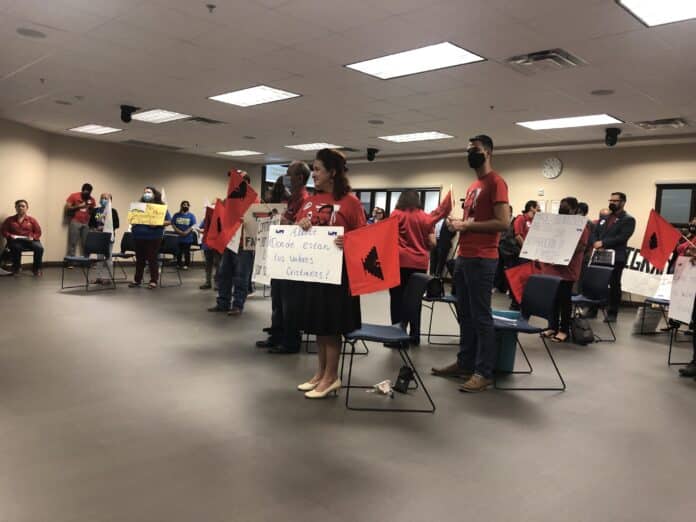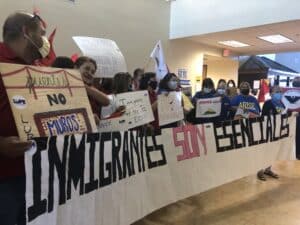
Concerns over the governor’s plan to incarcerate migrants entering the country unlawfully continue to deepen across the Rio Grande Valley. Immigrant advocates worry it would spark family separations, while Starr County’s top official considers the effect on their small jail.

(Valerie Gonzalez | [email protected])
Dozens of advocates with La Union del Pueblo Entero, or LUPE, as well as ARISE and representation for the Texas Civil Rights Project were present at the Hidalgo County Commissioners Court meeting Tuesday morning to show their opposition to Gov. Greg Abbott’s plans.
“I’m here, commissioners and judge, to tell you, to implore you not to accept or cooperate with the proposal from the governor to criminalize our migrant brothers,” Annette Garcia, an 11-year member of LUPE, said.
While state officers cannot detain migrants for entering the country through ports of entry, Gov. Greg Abbott’s plan unveiled last week in Del Rio proposes charging migrants with trespassing on private property and jailing them for up to 180 days.
“That would undoubtedly result in family separation 2.0,” Daniel Diaz, LUPE’s director of organizing, said Tuesday.
Dozens gathered to voice similar concerns, including Roberto Lopez, a community organizer with the Texas Civil Rights Project. In 2018, he sat in the McAllen federal courtrooms to track family separations during the Trump administration’s enforcement of the zero tolerance policy.
“We screened over 20,000 parents, or rather, individuals who were being prosecuted in the courtroom due to the zero tolerance policy,” Lopez said. “We counted over 1,200 individuals who were separated from their children alone here in the Rio Grande Valley’s McAllen courtroom.”
Hidalgo County Judge Richard Cortez asked the governor about the possibility of separating migrant families during the private meeting with Abbott, law enforcement and elected officials held before the public meeting in Del Rio last week.
“I asked him [if] he had considered the fact that some of these arrests would separate families,” Cortez said. “He said that the arrests would not separate any families. That was his simple answer.”
Cortez and other county officials, like Starr County Judge Eloy Vera, are also worried about the effects hundreds of daily arrests with six-month sentences could have on their jails.
Vera said Starr County’s jail has a capacity of about 275 beds, but many of them are used by federal inmates or inmates from other counties.
“My understanding is that they’re catching hundreds a day. So, it would take … a couple of days to fill up our jail,” Vera said.
The county is paid for those spaces, but if migrants are charged with trespassing, that stream of revenue would be threatened.
“We can stand to lose revenues of up to 3 million dollars or more,” Vera said. “Plus, now we can have an expenditure of 3 million dollars in addition. That would be a disaster for us. We couldn’t handle that.”
Abbott’s plan proposes keeping migrants who violate state law for up to 180 days, or six months — a punishment that could serve as a deterrent.
“We want to arrest somebody to have them prosecuted, to be put in jail, to stay in jail, to create an environment where people will choose they don’t want to come across the border in the State of Texas anymore because it’s not what they were expecting,” Abbott said last week in Del Rio.
Vera is concerned about the medical impact that could have on the jail population and staff. Though vaccination rates are increasing in Starr County, there would be an added financial responsibility to provide for those in the county’s custody.
“Once they go into our jail, they become our responsibility. If they need medications, we need to supply them with them. We need to pay for all this,” Vera said.
Abbott’s border plan hinges on $1 billion set aside by the Texas Legislature. He approved it last week, but said more details on how the money would be used are expected in the coming days.
The governor’s office also scheduled a news conference Wednesday in Austin where he is expected to share details of his border plan, including his plans to build more border wall in Texas.



